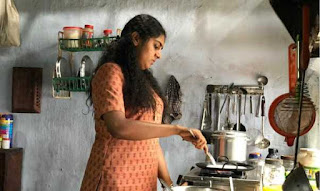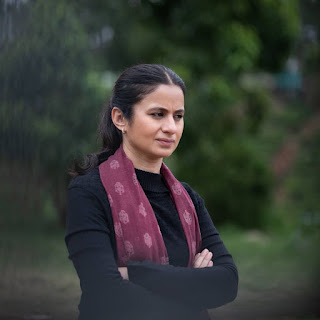The Not-So-Great Indian Kitchen - A Women's Day Special
Radhika Bhirani
~~ rbhirani@gmail.com
~~ The kitchen was buzzing. Piping hot and fresh tandoori paranthas were coming off the tawa. Vegetable bowls were being refilled or reheated, until everyone had eaten. Correction: Until everyone else had eaten.
As we -- my mother-in-law and I -- then sat down for lunch, a gracious guest asked, "Ek baat bataaiye... Itna kaam karke kitchen mein, kya apne aap banaaya hua khaana khud enjoy karte ho?" Our response came in unison, and in a jiffy: "Nahin".
It's a sad, but mostly universal reality, he then commented, raising a concern about the monotony of women's domestic drudgery -- one that is being pleasantly raised as a wake-up call of insidious sexism in the kitchen and within the precincts of a house, by a gamut of film and web content in India in recent times.
From "rasoda" politics on Indian television, we've moved to the politics of gender bias surrounding home and kitchen.
In telling the story of a newly married girl whose dreams of a happily ever after come crashing down as the horrors of domesticity unfold one day after another, "The Great Indian Kitchen", an unpretentious Malayalam film, holds up a mirror to almost 'kahaani har ghar ki, kahaani ghar ghar ki'.
Men eat, the women serve. Men sleep, the women sweep. Men find inner peace with yoga, women lose their peace of mind, as piece by piece as the vegetables they chop, the utensils they wash, and the clogged sinks they unclog. It's a dirty picture that makes you cringe, but a conscience cleaner at that. For women who work endlessly and tirelessly, dancing to the next becks and calls from the 'lords' and 'masters' of the home, it's a wake-up call to let them know that there is a life beyond kitchen and family, and that it's totally okay to live it. For men, "The Great Indian Kitchen" is like a kick in the butt to take note of the inherent notions of so-called 'gender privilege' in everyday life.
"It''s only the privilege for the men that the tea will always come to them. Haven''t we seen that in every home?" the film's director, Jeo Baby, asked in an interview to Press Trust of India, on being asked about his film depicting entitled Indian men -- one of them who waits for the wife to get him his toothbrush before she serves him tea. Only if the lady had a portable sink, I tell you!
The same man thwarts his daughter-in-law's desire to teach dancing. " What you do at home is greater than what bureaucrats and ministers do," he tells her. Cut to the next shot, she's seen hand-washing a man's underwear!
You see a pressure cooker releasing steam as a recurring metaphor for the lady's pent up emotions, which explode like a volcano in the end when she decides enough is enough and leaves the house. It leaves you with a thought: How many women really do that?
We saw the woman take a stand in Taapsee Pannu-starrer "Thappad", of course. She would serve her husband tea, arrange his clothes, put his files together, dust the house, take care of his mother's medication, et al.... until "ek thappad" from the husband makes her confront her own existential crisis. The film was quite a slap across the face of patriarchy that runs dark and deep in the society. In that pursuit, it also pointed at the unfortunate fact about how women, knowingly or unknowingly, perpetuate this societal conditioning by either telling their girls "bardaasht karo" or allowing their boys to become, as Rani Mukerji said in "Hum Tum", the "Tauliya lao" types.
There's also the heart-warming web series "Gullak", where Geetanjali Kulkarni (what an actor!) goes about making the 'invisibility of mothers', rightfully visible. Interestingly, "Gullak Season 2" has Kulkarni's character Shanti Mishra voice her concerns about how making a batch of fresh green chutney on a 'sil-batta' takes a toll on her ageing, aching knees, and in "The Great Indian Kitchen" also, we see how the men insist that the women make freshly hand-grounded coconut chutney -- a preference over the time and effort-saving mixer-grinder version. The clothes washing also is demanded to be done by hand, rather than the washing machine!
The catharsis of both the characters over the men's inertia and indifference regarding everyday household chores, is the story of the every'wo'man.
"Yeh bilkul sahi dikhaya hai," muttered my mother-in-law as we watched Gullak, and Shanti Mishra poured her heart out about the "thankless" nature of a woman's life in the kitchen. But my mom-in-law tells me how times have still changed for the better nowadays. That men are stepping up. And women are speaking up
But still, it's a far cry to think that the notion of 'Bharatiya Sanskaar' -- pushing women into selfless and subservient servitude -- for the husband, the family, and the children, is going to vanish into thin air. In fact, the expectation that a woman can balance both worlds of home and work to the T, can create havoc at homes! But as Sima Aunty from Netflix's "Indian Matchmaking" would tell you -- "thoda compromise toh karna padega”, “thoda adjustment toh karna padega”, "thoda flexible toh hona padega".
Over the years, we are seeing even the short film space toying with themes of internalised patriarchy and misogyny in their own little, but impactful way.
There's the humble "Ghar Ki Murgi", an Ashwini Iyer Tiwari directorial, about a wrung out homemaker's life. Seasoned actor Sakshi Tanwar is seen as a homemaker, who goes about running the household, running errands, cooking, washing, cleaning, shopping; and providing TLC to her husband, kids and in-laws, and tries to make sense of whether it's her "job" or "duty".
At one point in the narrative, the part-time maid in the film, tells her, “Didi, you’re the only one who understands a maid’s problems”. It's a weighty punchline, almost pointing at a homemaker’s status in her own home. In "Ghar Ki Murgi", the catharsis comes at a point when the woman decides to book a month-long solo trip to Goa, leading to mayhem in a household which realises her indispensability soon enough. Should it take absence to remind someone of the importance of one's presence, I wonder?
Another short film worthy of mention is the Shefali Shah-starrer Juice, directed by Neeraj Ghaywan. It encapsulates a simple story of the life of most middle-class Indian women, for whom a house party is more chaos than fun because; well, the men booze and eat, they booze and chat. Shah's character cleans up half-eaten bones of chicken from a table, and refills an air cooler being used by the men as they go on with their 'boozeness', before going back to a hot and steamy kitchen to cook for them. And she's not alone. The wives of the men are also sharing the load (pun totally intended!).
Shah's character is pushed to the edge following discussions among the women in the kitchen -- of pushing a young woman to plan a pregnancy to “save” her marriage after the “spark” is gone -- and after observing a young girl being asked to serve her brothers. But her patience gives way after her requests to her husband to fix a fan for her 'kitchen guests' go unattended. She retorts with silence. She takes a glass, pours out orange juice, drags a chair and makes herself comfortable right in front of the air cooler she fixed for the men.
After all, they don't say it for nothing that, actions speak louder than words!








So well written. Its true that even today while men do step up or want to, its always glorified beyond belief. The lockdown made us all realise that when men do step in to "help" it leads to insta stories of "gratitude" and compliments. Waiting for the day when sharing the load will become normal.
ReplyDeleteTotally. Thank you for reading.
Delete